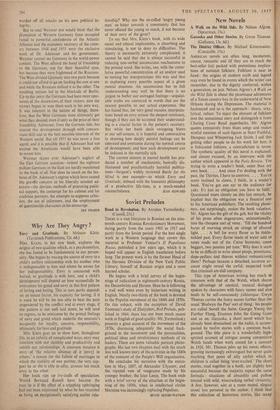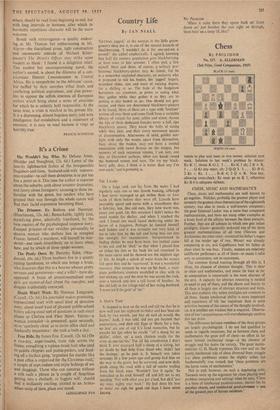New Novels
A Walk on the Wild Side. By Nelson Algren. (Spearman, 15s.) The District Officer. By Michael Kittermaster. (Constable, 15s.) AMERICAN novels are often long, incoherent, coarse, romantic and (if they are to reach the best-seller list) packed with pretentious implica- tions of national folklore. Folklore is near to hand : the origins of modern myth and legend may even be found in events which the writer can remember, due to the dignity conferred, within a generation, on jazz. Nelson Algren's A Walk on the Wild Side is about the picaresque adventures of a Texan country boy in the underworld of New Orleans during the Depression. The material is hackneyed and so is the approach : sleazy, sexy, lyrical, robust. To inject the element of folklore into the sensational story and distinguish it from Charing Cross Road paperbacks, Mr. Algren quotes extensively from blues songs and makes wistful mention of such figures as Starr Faithful, Dempsey and Whispering Jack Smith. I call this getting other people to do his work for him; it is fabricated folklore, a contradiction in terms. The synthetic quality of this novel is explained. and almost excused, by an interview with the author which appeared in the Paris Review. 'I'm trying to write a reader's book, more than my own book. . . . And since I'm dealing with the past, the Thirties, I have to contrive. . . . You're more inclined to clown, I think, in a reader's book. You've got one ear to the audience for yaks. It's just an obligation you have to fulfil.' Questioned more closely on .this last remark, he implied that the obligation was a financial one to his American publishers. The resulting phoni- ness, not surprisingly, makes the book valueless. Mr. Algren has the gift of the gab, but the vitality of his prose often degenerates, unintentionally, into the cheapest sort of verse : 'Till the hundred harps of morning struck on strings of silvered light. . . . A bell for every flavor as he tinkle- tinkled past. Every flavor made of water sold to tunes made out of tin. Come bummies, come beggars, two pennies per tune.' Why does it seem to be so difficult to write about pimps, prostitutes, dope-pedlars and thieves without romanticising them? Perhaps because a detached, accurate ac- count might reveal the awful, suspected truth that criminals are dull company.
This type of American writing has much in common with that of the Welsh, which shares the advantage of comical, musical dialogue spoken by characters with fancy names and also tends to be self-consciously folklorique. Gwyn Thomas carries the fancy names further than the usual `Blodwyn the Post' sort of thing : his people are called Sewell the Sotto, Georgie Young the Further Flung, Erasmus John the Going Gone and so on. Gazooka, a short novel which has already been dramatised on the radio, is accom- panied by twelve stories with a common back- ground. The title piece is a wonderfully high- spirited account of intrigue among competitive Welsh bands when work ceased for a summer in 1926. Mr. Thomas piles up his comic effects, growing increasingly extravagant but never quite reaching that point of silly surfeit which in children is called being 'over-excited.' The short stories, read together in a book, are slightly less successful because the majority repeat the same formula : situations of absurdity and pathos treated with wild, wisecracking verbal virtuosity. A few, however, aim at a more muted, elegiac mood less personal to the author. I think that this collection of humorous stories, like many
others, should be read from beginning to end, but with long intervals in between, after which its inevitably repetitious character will be the more welcome.
Beside such extravagance—a quality endear- ing in Mr. Thomas but embarrassing in Mr. Algrcn—the disciplined prose, tight construction and unromantic attitude of Michael Kitter- master's The District Officer may strike some readers as bleak : I found it a delightful relief. This modest but uncompromising novel, the author's second, is about the dilemma of a con- scientious District Commissioner in Central Africa. He is sympathetic to the Africans' cause, but baffled by their complex tribal feuds and conflicting political aspirations, and also power- less to oppose the selfish interests of European settlers which bring about a series of atrocities for which he is unfairly held responsible. At the same time, a crisis is reached in his private life. It is a depressing, almost hopeless story, told with intelligence, fair-mindedness and a minimum of emotion; it is easy to read because it rings so horribly true.
FRANCIS WYNDIIAM































 Previous page
Previous page